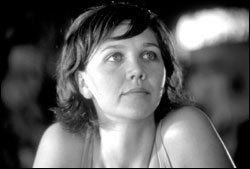John Sayles’ latest ensemble-agenda piece feels like a telenovela translated into the arch English of the Upper West Side. Casa de los Babys (which opens Friday, Oct. 3, at the Metro and Uptown) features all kinds of meaty roles and conflicts ripe for the chewing, but the main course never arrives. In an unnamed Latin American country, five interminably chatty Yankees and one token Irishwoman sit in a semiluxurious beachfront hotel while semicorrupt bureaucrats and hoteliers conspire to keep them waiting for the babies they so desperately want to adopt. In the estrogen talk circle, Daryl Hannah plays the fit woman, Mary Steenburgen the wise one, Lili Taylor the wise-ass one, Marcia Gay Harden the stupid, conservative one, Maggie Gyllenhaal the tremulous one, and Susan Lynch the poor Irish one. To each, Sayles allots precisely one actress-y Big Moment, but each of those moments is unrelated to the other. It’s like Night of the Iguana meets Los Olvidados meets The Women, only these influences don’t actually meet; they just circle like scorpions in the ring, never scoring any stings.
Sayles’ usual working method, best deployed recently in Sunshine State, is to alternate between many overlapping characters in a big, issues-oriented picture. In State the main issue was land use, in Lone Star history, and in City of Hope the dissolution of community. Here, his subject is dead-on topical and seemingly perfect for his great female cast: infertile women, most of them older, affluent, educated, and articulate, who are forced into awkward intimacy by bureaucratic fiat (call it dramatic contrivance, if you will).
Sayles treats the late-mom demographic with characteristic earnestness and intelligence (also flecked with humor, though not so funny as Statewhich is worrisome in a career that needs leavening). Yet he can’t seem to maintain a dramatic focus on the dramatic urgency these would-be moms feel about motherhood. They bicker about nature versus nurture, allude to husbands back home in the States, and occasionally fight back tears, but they never address directly why they’re so intent on adopting.
As a result, each of the six main characters feels skimpy and undeveloped. Gyllenhaal’s young trophy wife is seemingly being pressured by her rich WASP husband to produce an heir, any heir. But even when she acts up a storm in her designated Big Moment (a cell phone call to her spouse), the scene is entirely reactive and one-sided. You don’t believe there’s anyone on the line, anyone back home, any context for all this baby lusteven though everyone’s behaving that way. The movie is like a false pregnancy, felt but not real.
AS EVER, Sayles is down with the oppressed (though who is exploiting whom in this film is never resolved). Casa begins with the visited, not the visitors. Half the dialogue is in Spanish (with subtitles), as we meet la gente who silently cater to the deep-pocketed gringos. Among them are the unwanted, illiterate urchins who hustle for pesos and huff spray paint out of paper bags.
In the movie’s best scene, conspicuously free of dialogue, one homeless lad prepares to sleep on the beach and looks up at the uncaring stars, gold paint glittering on his innocent face. Who would adopt this boy? Nobody, it seems. He crosses paths with the Irishwoman who, though almost broke, buys him a book he can’t read. He wants money, and she wants a baby with life’s seemingly limitless potential; around them both, Sayles shows all those sad limits that have brought the characters together, however glancingly. No one’s lives will be changed by these brief encounters. Likewise this short (95-minute) film lacks a transformative power; it’s an oddly truncated slice of too many lives.
Casa is most interesting when it explores the socioeconomic forces that drive the baby racket. As the weary but enterprising hotel owner, Rita Moreno is the one figure in Casa who cuts through the crap. “Children are a curse,” she declares of her layabout son, a grown man who can’t even fix a sink and surreptitiously gets stoned in the guests’ rooms. Moreno’s character is a profiteer in cahoots with her adoption lawyer brother (their export product is babies), while her Marxist son rails to his drunken friends against this neonatal colonialism: Uncle Sam again plundering his nation’s birthright (even as our dollars buy him his dope and beer). Meanwhile, Harden’s Ugly American bitches about the costly delays, expensive attorneys, and escalating hotel bills: “They’re going to make us earn our babiesit’s the balance of trade.”
There are additional subplots about a knocked-up 14-year-old and a charming unemployed guy; but like that of the nameless urchins, they go nowhere. The one believable Big Moment comes from a hotel maid (Vanessa Martinez from Lone Star), a knockout monologue I don’t want to give away but which reaches across the language barrier to the English-speaking guest who listens to her. She’s ruefully looking back (Sayles’ best narrative mode), not forward like all the privileged women who naively believe their new, fully actualized lives will only begin with motherhood.









